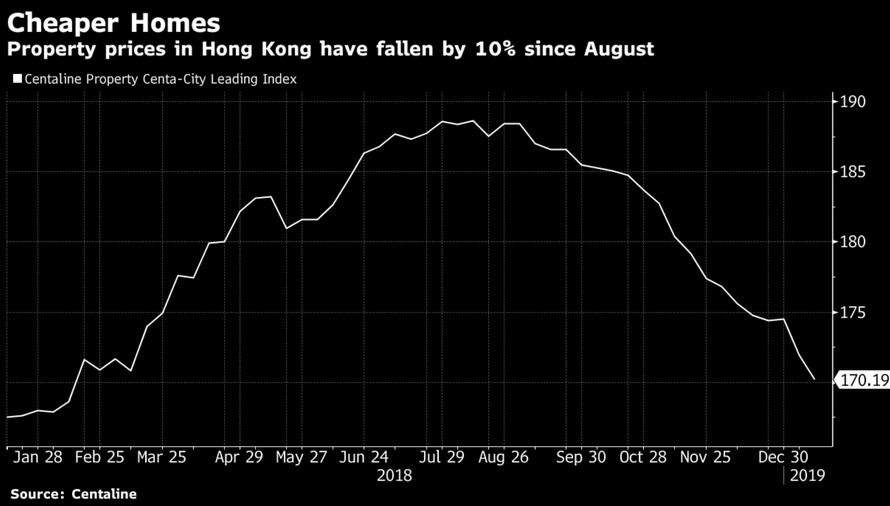Though it recently entered correction territory following the longest streak of falling prices since 2016, Hong Kong’s housing market remains one of – if not the most – unaffordable in the world.
And as struggling locals look for somewhere – anywhere – to live for a relatively modest price, more are turning to an innovative, if illegal, solution. According to Bloomberg, the latest housing trend in the New Territories, a region of Hong Kong that is mostly wetlands, parks and mountains, is building illegal houses out of prefabricated steel boxes.
Locals call them container homes. And while they’re growing in popularity, almost all of them are illegal, having been built on land not zoned for housing, and/or without the government approval necessary to ensure it meets standards for ventilation and fire-safety.
After walking through a deserted plot of rural land on an unevenly paved road, Gilbert Wong arrives at a metal-fenced gate that looks like the entrance to a warehouse, or maybe a car park – ubiquitous in Hong Kong’s New Territories.
But behind this seemingly hostile facade is Wong’s humble home: a prefabricated steel box that looks a lot like a basic shipping container. Such dwellings, dubbed container homes, have become an increasingly popular option for residents squeezed out of the world’s least affordable property market.
The vast majority are also illegal.
“Of all the prefabricated homes in the style of a container that I have seen in ads or online, I can tell you 99.9 percent aren’t in compliance with the law,” said Vincent Ho, a managing director at surveying and property consultancy firm Freevision Ltd.
Estimating the number of container homes is difficult because they’re usually tucked away in far-flung areas across the territory, but orders for containers have doubled since 2016, with 40% built specifically for dwelling purposes, according to Ivan Chan, a director of portable building manufacturer Markbox. Chan’s company is producing about 200 containers for living every year. The most popular costs about $19,000 – roughly half of the down payment for an apartment.
The low-cost of container homes has attracted some government interest, with the city authority launching a project to build 90 legal container homes to be placed in the city’s poorest districts, where they will be a “stop-gap” option for people waiting for public housing.
But already, the average waiting time for the program – which was launched in 2012 – has more than doubled to five-and-a-half years.
Even middle-class Hong Kongers are opting to try the container home life, despite the longer commute times they face from living in more remote parts of the territory. And the downsides like leaks during severe weather.
Wong, 30, didn’t have a container home in mind when he and his girlfriend started to look for a place to live last year. But they quickly realized apartment rents were way out of their budget.
It took the couple about a month to settle on their current 19-square meter home that rents for HK$4,500 a month. To rent just one room of a similar size in a nearby apartment costs roughly 20 percent more than that.
The couple like the cheap cost and the air quality is better than on Hong Kong Island. There are downsides, however. Container homes aren’t built to withstand extreme weather, so when Typhoon Mangkhut hit last September, there were leaks. The remote location also means the couple spend more time, and money, commuting.
Wong said he didn’t ask whether the home was a legal residential property when he moved in, and doesn’t plan to. He admits there’s a chance the land it sits upon hasn’t been zoned for residential use.
But until circumstances change, Wong plans to stay put.
“Home prices will definitely remain high,” he said. “There’s a mentality among Hong Kong people that one must own an apartment, and that pushes up prices.”
And though the average home price fell more than 10% by the end of 2018 from its peak in August, sheer supply-demand dynamics suggest that the city will remain extremely unaffordable for the forseeable future, virtually guaranteeing a niche for the container home market.
via ZeroHedge News https://ift.tt/2HdXlAN Tyler Durden
